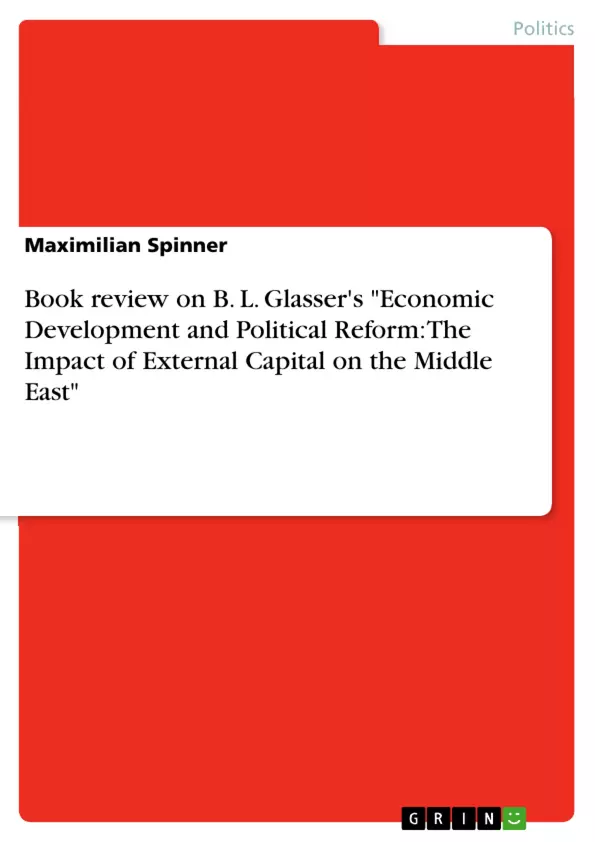Oil seems to prevent the development of democracy and a free market economy. Oilrich countries as diverse as Nigeria, Saudi-Arabia, Irak, Iran, Venezuela or Azerbaijan appear to be among the least democratic countries with highly closed economies and little signs of change in their course. This assumption can be confirmed by the empirical correlation between low indices in democratic rule and in the openness of the economy, and the endowment with natural resources. Intuitively everybody could explain that in each of these countries a narrow elite can keep up this state due to almost unlimited and unconditional cash inflows compensating for ineffective economic structures and buying off the population with populist policies in subsidizing consumption or low taxation.
In his book Economic Development and Political Reform – The Impact of External Capital on the Middle East Bradley Louis Glasser puts the development of Middle Eastern states with different degrees of resource endowment into a broader perspective. Economic liberalization and democratization are explained in the context of external capital contributing to both economic development theories and transitology.
Inhaltsverzeichnis (Table of Contents)
- Introduction
- The Impact of External Revenue on Political and Economic Reforms
- Electoral Systems and Domestic Reform Strategies
- The Role of Political Parties and Reform in the Middle East
- Foreign Aid and Domestic Reform in Jordan and Egypt
- Conclusion
Zielsetzung und Themenschwerpunkte (Objectives and Key Themes)
Bradley Louis Glasser’s book "Economic Development and Political Reform - The Impact of External Capital on the Middle East" examines the influence of external revenues on the political and economic reforms of four Middle Eastern countries: Turkey, Morocco, Egypt, and Kuwait. The book investigates the relationship between external capital, economic liberalization, and democratization, particularly exploring why some countries with limited external revenues embraced reforms while others, with abundant resources, resisted them.
- The Impact of External Revenue on Political and Economic Reforms
- The Relationship Between External Revenue and Domestic Reform Strategies
- The Role of Electoral Systems in Shaping Reform Outcomes
- The Influence of Political Parties on Reform Processes
- The Impact of Foreign Aid on Domestic Reforms
Zusammenfassung der Kapitel (Chapter Summaries)
- Chapter 1: Glasser establishes his research questions, hypotheses, and basic assumptions, reviewing existing literature on the topic.
- Chapter 2: This chapter outlines the developments leading to the implementation of reform programs in countries with limited external revenue, contrasting them with the strategies of resource-rich countries that maintained the status quo.
- Chapter 3: This chapter examines the reflection of different reform strategies in the electoral systems of the four countries. It explores how economic pressures and political decisions shaped electoral structures.
- Chapter 4: This chapter focuses on the role of political parties in legitimizing or opposing reforms. It analyzes the interactions between governments and political movements in shaping reform outcomes.
- Chapter 5: This chapter investigates the impact of foreign aid on domestic reform, particularly in Jordan and Egypt.
Schlüsselwörter (Keywords)
The main keywords of the book are economic development, political reform, external capital, Middle East, rentier state, foreign aid, democratization, electoral systems, political parties, and domestic coalition building. The study focuses on the impact of external revenues, particularly foreign aid, on the political and economic structures of Middle Eastern states.
Frequently Asked Questions
How does external capital affect political reform in the Middle East?
According to Glasser's study, abundant external revenue (like oil) often allows elites to resist democratic reforms, while limited resources may force countries to embrace economic liberalization.
Which countries are analyzed in Glasser's book?
The book examines four specific Middle Eastern countries: Turkey, Morocco, Egypt, and Kuwait, comparing their different levels of resource endowment and reform strategies.
What is the "Rentier State" theory mentioned in the text?
The rentier state theory suggests that countries relying on external rents (oil, foreign aid) can "buy off" the population with subsidies and low taxes, thereby preventing the development of democracy.
What role do electoral systems play in the reform process?
Glasser explores how economic pressures and political decisions shape electoral structures, which in turn influence whether reforms are successfully implemented or blocked.
How does foreign aid impact domestic reforms in Egypt and Jordan?
The study investigates whether foreign aid acts as a catalyst for reform or if it provides governments with the means to maintain the status quo without making political concessions.
- Quote paper
- Maximilian Spinner (Author), 2003, Book review on B. L. Glasser's "Economic Development and Political Reform: The Impact of External Capital on the Middle East", Munich, GRIN Verlag, https://www.grin.com/document/13411



